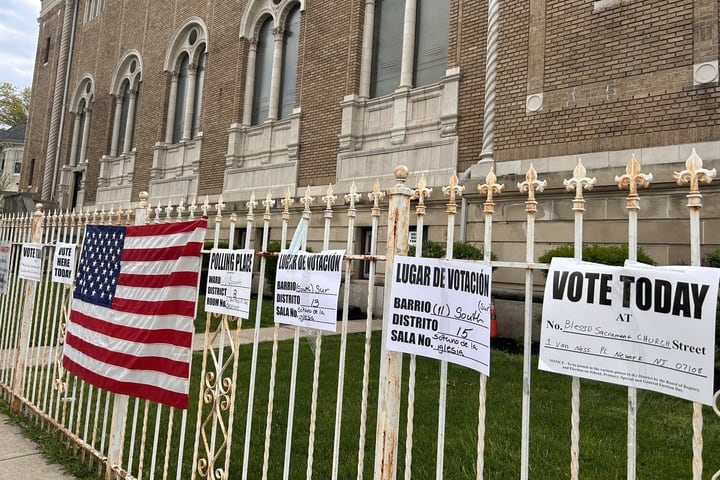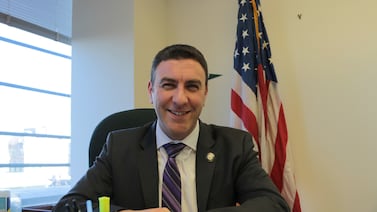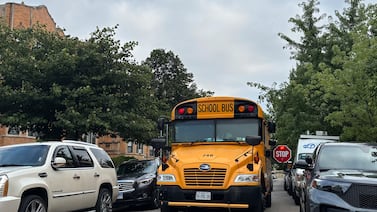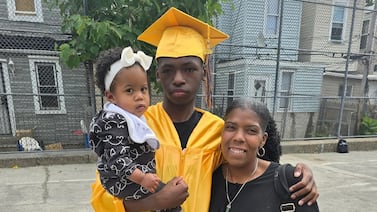Sign up for Chalkbeat Newark’s free newsletter to keep up with the city’s public school system.
Last month, the Newark City Council became the first in the state to lower the voting age to 16 in school board elections. But, the implementation will be delayed until the 2025 election due to voter registration issues, according to city officials.
Supporters and advocates of the lower voting age, which the city council instituted last month, are seeing the delay as an advantage — not a setback — in their efforts to use the expanded voting rights as a way to improve dismal voter turnout in the April school board races.
With the extra year, advocates aim to ensure as many young people as possible are “ready, educated, and empowered” to vote, they said in interviews this week.
“I think that it’s an excellent time for youth to be able to start to test the waters on what it means to fully grasp civic engagement and the power of being civically engaged,” said Shennell McCloud, chief executive officer of Project Ready, an advocacy nonprofit in Newark.
The city council’s unanimous approval of the historic ordinance last month made Newark the first in the state to lower the voting age to 16 for school board elections. But those teens will not be able to vote until next year’s school board election because state and county officials need more time to get voter registration machines and equipment programmed and tested, city clerk Kecia Daniels said in an email this week.
“It takes time to get this done,” Daniels said. “Everyone is working feverishly to effectuate the change as soon as possible.”
New Jersey’s Division of Elections, in the Secretary of State’s office, is managing the technical implementation of the Newark ordinance, according to the Essex County Superintendent of Elections office.
The voting rights expansion to Newark’s 16- and 17-year-olds received widespread approval from state and local leaders pushing young people to become more involved with the voting process. It also received praise from public school students like 16-year-old Science Park High School student Breanna Campbell, who told council members that it “feels good for this law to be passed” because it shows “how our voices can make a difference.”
Historically, turnout for the city’s school board election has hovered around 3% and some council members raised concerns that turnout could go even lower if teens don’t participate. Residents at last month’s meeting worried about the level of civic awareness among youth and questioned if they were prepared to participate in this year’s school board elections.
But advocates say Newark’s teens are eager to get involved and learn more about their new right to vote. The extra time will allow advocates to engage and educate youth who are already interested in the election and reach those who are not yet, said Deborah Smith Gregory, president of the Newark chapter of the National Association for the Advancement of Colored People.
Her work mainly focuses on engaging city voters in school board and general elections. Smith Gregory said students have “mixed feelings” about the election “because they understand that without the proper education and empowerment, they could be manipulated by people.
“These young people are very savvy because they are looking at all sides to see what each side is doing and saying,” Smith Gregory said. “For them, it’s about what is going to result in the best quality of life for the people who will be represented.”
For more than a decade, the NAACP-Newark chapter, has held school board candidate forums in Newark ahead of the April elections. It’s important to the group that voters hear from candidates directly instead of by mailers or flyers, Smith Gregory said. They also invite students to ask questions of the candidates during those forums and will continue to stress that as Newark looks to engage city teens, she added.
The hope is that by reaching Newark’s young voters, they can also get through to their parents who may not understand the importance of voting, said Smith Gregory. They hope to continue their voter registration drives throughout city high schools.
“We have so many adults who are not engaged in the electoral process. We don’t want to have students become like these adults. We want them to be better than that,” she added.
McCloud, from Project Ready, wants to make it easier for young voters to cast their ballots by expanding opportunities for those who can’t make it to the polls on Election Day. Project Ready is working with Essex County election officials to set up ballot boxes outside all Newark schools so students can vote on and ahead of Election Day.
“They could be sick, they could be not in school, or they could be at work,” McCloud said. “So we want to make sure that they have that access through and through.”
They are also working with the county clerk’s office to create a task force of civic engagement organizations across the city that would develop a five-point plan to help young teens understand the voting process, outline the steps they need to take, and ultimately, become educated voters. The information gap is “a gap that exists across the city,” McCloud said, and her goal is to share candidate and election information so residents can make informed decisions.
In the meantime, the New Jersey Institute for Social Justice wants to work with city and school officials to strategize civic engagement efforts for Newark’s new voters and work through the challenges related to voter registration. Micauri Vargas, associate counsel for the institute, said many students working on the institute’s campaign are eager to start working directly with Newark high schools and their peers.
This fall, the organization plans to educate students about their new rights, how to register to vote once the state clears its guidance, and the importance of school board elections, Vargas added. The group is also looking at voting accessibility.
“We’re making sure that materials are accessible in different languages, but also accessible for people with disabilities through vote-by-mail options and that all those things are available to everyone in the same way,” Vargas added.
Newark Council president LaMonica McIver, who sponsored the city ordinance, said her office is planning to work with all schools in Newark to push a civics campaign and host civic workshops for students and parents alike. McIver is “eager and excited” to see city teens participate in the school board election, a sentiment, Vargas said, is shared by this generation of voters.
“We’re not aware of all the logistics quite yet but this youth is just so ready. Everything I’ve heard so far has been so positive, and they’re ready to vote, I know that,” Vargas added.
Jessie Gómez is a reporter for Chalkbeat Newark, covering public education in the city. Contact Jessie at jgomez@chalkbeat.org.






